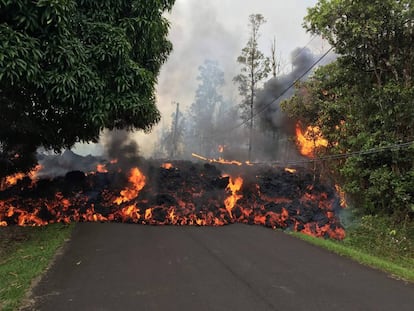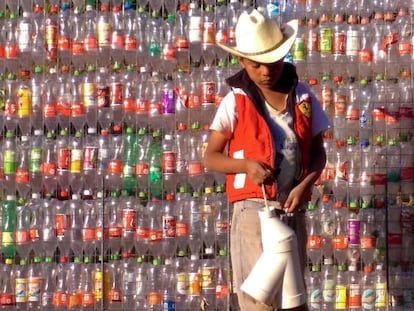Guatemala: A volcano erupts and a city is gripped by panic
Residents of Escuintla flee in fear after new activity from the Volcán de Fuego on Tuesday

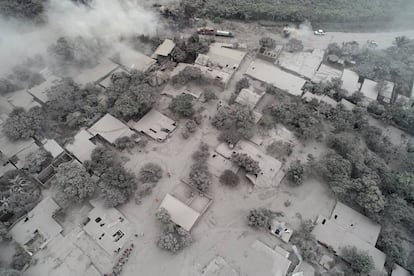
By 8am, the Volcán de Fuego in Guatemala had begun to roar and thunder. The residents of El Rodeo who had evacuated were forced to relive the thunderous explosions that had taken place a mere two days ago. The black clouds rose, lit by the fire in the crater, as a second explosion shook the earth two hours later. Local authorities sent warnings of “an elevated risk of explosive activity” from the volcano, as well as imminent risk of pyroclastic flows – currents of hot gas and volcanic matter.
By then, rescuers had one eye on the ground, where they were searching for survivors or entombed bodies, and the other on the 4,000-meter-tall colossus towering in the distance. Nerves were on edge. Some people wanted to immediately evacuate the area, where 75 people had been found dead and almost 200 remained missing, while others argued the rescue efforts should continue in these crucial hours.
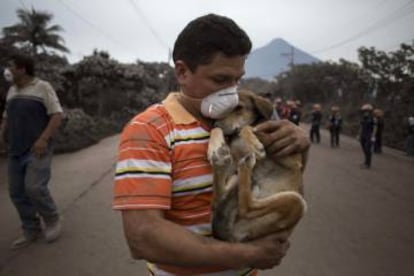
The third explosion happened 48 hours after the eruption and threw the city back into chaos. This time though it was not an eruption, but the movement of a lahar, a mass of mud, sediment and water at high temperatures, which can be even more dangerous than lava. This lahar was the result of the previous explosions, which had heated the mass and allowed it to flow down the mountainside, destroying everything it encountered.
Panic had taken hold of the city of Escuintla, from where most of the rescue efforts were based and organized from
At this point, military personnel, civil protection forces, firefighters, ambulance drivers and residents all began to run away from the volcano. Panic had taken hold of the city of Escuintla, the capital of the region by the same name, and the home base for most of the rescue efforts.
Rumors and videos spread by word of mouth and from phone to phone warning about the catastrophe drawing closer. “The lava rivers are coming,” some warned; “The fire storm is imminent,” others added. The panic was obvious in the hundreds of families that threw everything they could into plastic bags and fled from the incoming river of lava.
Motorcycles carrying four passengers, pickup trucks loaded with people and buses filled to the brim began to escape, and in a few hours the city of 200,000 had been evacuated. Each vehicle carried everything it could, from relatives and luggage, to food and television sets… Every store had closed its doors and a vibrant, industrial city now lay empty.
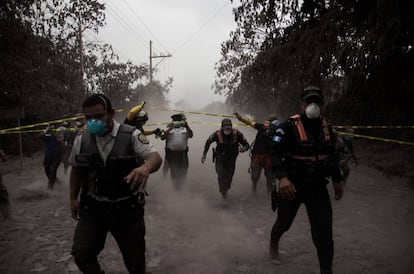
The announcement from the Volcanic Institute increased the panic. It warned that “the activity [of the Volcano] continues” and indicated the possibility of “additional pyroclastic flows in any of the neighboring hillsides in the following hours or days. Furthermore, due to the presence of rain in the volcanic area, we can expect further lahars to flow.”
“We brought the little we could carry. The most important thing was saving our lives,” said Felipe Camposeco, without breaking his pace. “On television, they announced that the lava was very close and that we had to leave soon. My only regret is that I could not bring my mother with me, she is too old and cannot walk and I could not carry her,” he added, as he walked alongside his family, each carrying a load over their heads.
“I had already moved my whole family to another town an hour away from Escuintla in case warnings about the possible fire storm came true,” explained Ricardo Valenzuela, as he closed the metal gates to his furniture store in the center of town.
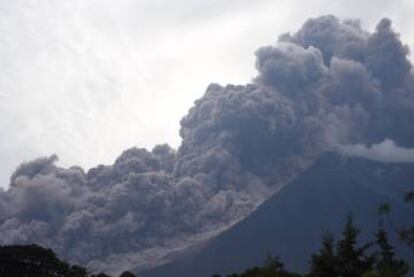
As Julio Ordices walked with his family, he repeated: “We are afraid, we are afraid… they have said it on the news.” The Ordices decided to move in with their other relatives in a nearby village. Julio said that he had not been able to sleep out of fear of an imminent explosion.
“I saw it on the news,” “My friend told me,” “I saw it on my phone,” or “They told my son,” said most of the fleeing people. Very few had actually been warned directly by the National Coordination for Disaster Reduction to evacuate the city. The fear that a big catastrophe was about to happen worked in its place.
The neighbors who doubted if the apocalypse had come had their fears confirmed when the afternoon sky darkened and the volcano roared deafeningly, as rain fell harshly on the city.
English version by Andres Cayuela.
